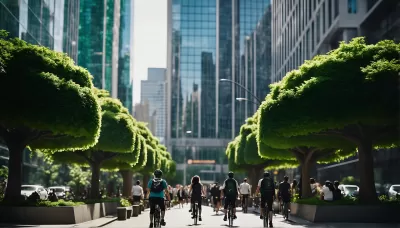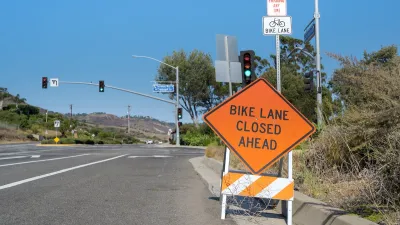Study participants were more likely to support sustainable transportation projects when shown AI images of what the completed real-life infrastructure would look like, suggesting generative AI could be a useful tool for planners.

Researchers in a new study published in Nature showed people AI images of what United States cities would look like with fewer cars and more space for pedestrians, cyclists, and public transit — and people liked what they saw. In fact, they were more likely to support government spending to implement those sustainable transportation policies than people to whom the project and concepts were just described. Petapixel senior news editor Matt Growvcoot explored the study’s results in a recent article.
“The MIT Sloan School of Management presented 3,100 participants with a hypothetical $500 million bill that would replace half of all car lanes in the United States with bus lanes, bike lanes, and wider sidewalks. The subjects were shown a photograph taken from Google Street View showing a cityscape dominated by cars and then three AI alternatives showing how the bill could affect urban environments,” he writes. “The participants who saw the AI illustrations of the city designed for pedestrians rather than cars were more likely to say they would support the fictional bill. Other participants who were simply shown slides with words such as 'greener' and 'bikeable' or rudimentary cartoons of public transport and foliages were less likely to show support for the bill.”
In car-centric America, people have very strong opinions and reactions when planners and policymakers start talking about “taking away” cars, or space from cars. Could AI-generated images be the key to building public support and political will around sustainable transportation projects? This study certainly suggests so. Regardless, it seems like one ethical use of AI-generated images and a potentially valuable AI tool to add to planners’ toolkits.
FULL STORY: People Support Car Bans When Shown AI Images of What Cities Would Look Like

Planetizen Federal Action Tracker
A weekly monitor of how Trump’s orders and actions are impacting planners and planning in America.

Congressman Proposes Bill to Rename DC Metro “Trump Train”
The Make Autorail Great Again Act would withhold federal funding to the system until the Washington Metropolitan Area Transit Authority (WMATA), rebrands as the Washington Metropolitan Authority for Greater Access (WMAGA).

The Simple Legislative Tool Transforming Vacant Downtowns
In California, Michigan and Georgia, an easy win is bringing dollars — and delight — back to city centers.

The States Losing Rural Delivery Rooms at an Alarming Pace
In some states, as few as 9% of rural hospitals still deliver babies. As a result, rising pre-term births, no adequate pre-term care and "harrowing" close calls are a growing reality.

The Small South Asian Republic Going all in on EVs
Thanks to one simple policy change less than five years ago, 65% of new cars in this Himalayan country are now electric.

DC Backpedals on Bike Lane Protection, Swaps Barriers for Paint
Citing aesthetic concerns, the city is removing the concrete barriers and flexposts that once separated Arizona Avenue cyclists from motor vehicles.
Urban Design for Planners 1: Software Tools
This six-course series explores essential urban design concepts using open source software and equips planners with the tools they need to participate fully in the urban design process.
Planning for Universal Design
Learn the tools for implementing Universal Design in planning regulations.
Smith Gee Studio
City of Charlotte
City of Camden Redevelopment Agency
City of Astoria
Transportation Research & Education Center (TREC) at Portland State University
US High Speed Rail Association
City of Camden Redevelopment Agency
Municipality of Princeton (NJ)





























